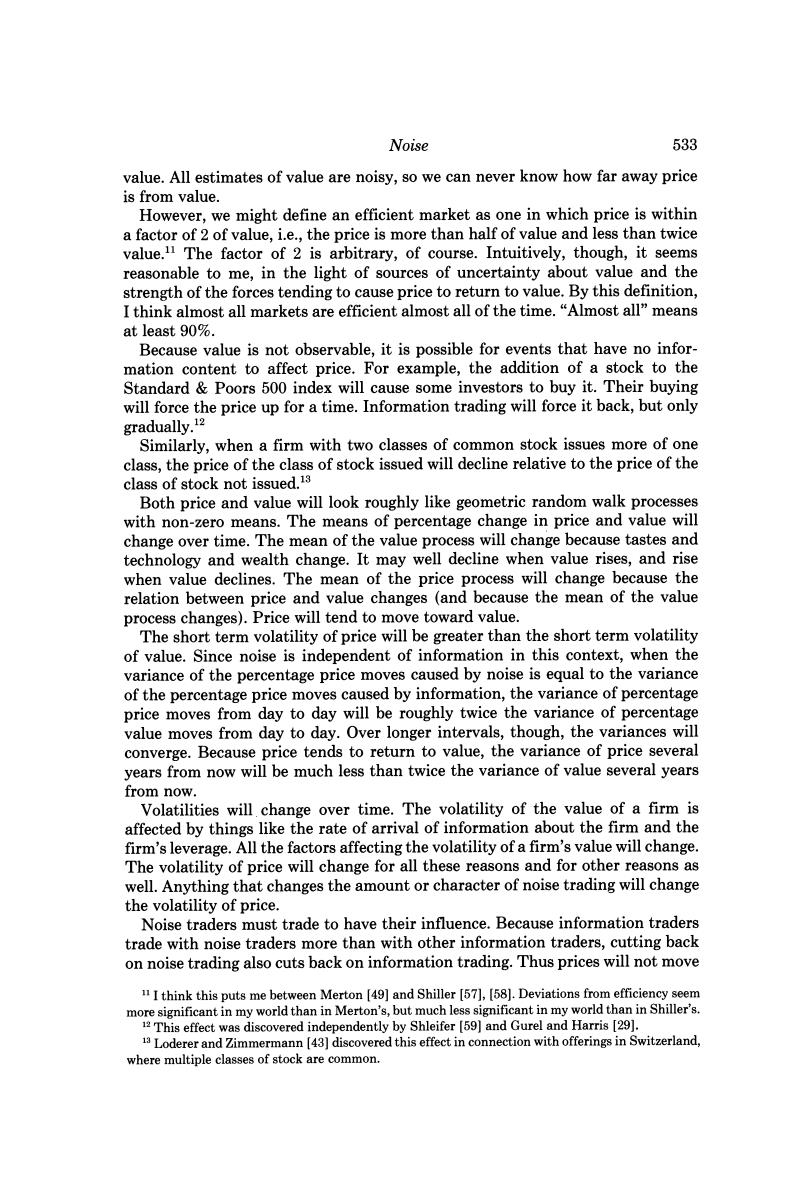正在加载图片...

Noise 533 value.All estimates of value are noisy,so we can never know how far away price is from value. However,we might define an efficient market as one in which price is within a factor of 2 of value,i.e.,the price is more than half of value and less than twice value.11 The factor of 2 is arbitrary,of course.Intuitively,though,it seems reasonable to me,in the light of sources of uncertainty about value and the strength of the forces tending to cause price to return to value.By this definition, I think almost all markets are efficient almost all of the time."Almost all"means at least 90%. Because value is not observable,it is possible for events that have no infor- mation content to affect price.For example,the addition of a stock to the Standard Poors 500 index will cause some investors to buy it.Their buying will force the price up for a time.Information trading will force it back,but only gradually.12 Similarly,when a firm with two classes of common stock issues more of one class,the price of the class of stock issued will decline relative to the price of the class of stock not issued.13 Both price and value will look roughly like geometric random walk processes with non-zero means.The means of percentage change in price and value will change over time.The mean of the value process will change because tastes and technology and wealth change.It may well decline when value rises,and rise when value declines.The mean of the price process will change because the relation between price and value changes (and because the mean of the value process changes).Price will tend to move toward value. The short term volatility of price will be greater than the short term volatility of value.Since noise is independent of information in this context,when the variance of the percentage price moves caused by noise is equal to the variance of the percentage price moves caused by information,the variance of percentage price moves from day to day will be roughly twice the variance of percentage value moves from day to day.Over longer intervals,though,the variances will converge.Because price tends to return to value,the variance of price several years from now will be much less than twice the variance of value several years from now. Volatilities will change over time.The volatility of the value of a firm is affected by things like the rate of arrival of information about the firm and the firm's leverage.All the factors affecting the volatility of a firm's value will change. The volatility of price will change for all these reasons and for other reasons as well.Anything that changes the amount or character of noise trading will change the volatility of price. Noise traders must trade to have their influence.Because information traders trade with noise traders more than with other information traders,cutting back on noise trading also cuts back on information trading.Thus prices will not move 1I think this puts me between Merton [49]and Shiller [57],[58].Deviations from efficiency seem more significant in my world than in Merton's,but much less significant in my world than in Shiller's. 1This effect was discovered independently by Shleifer [59]and Gurel and Harris [29]. 13 Loderer and Zimmermann [43]discovered this effect in connection with offerings in Switzerland, where multiple classes of stock are common